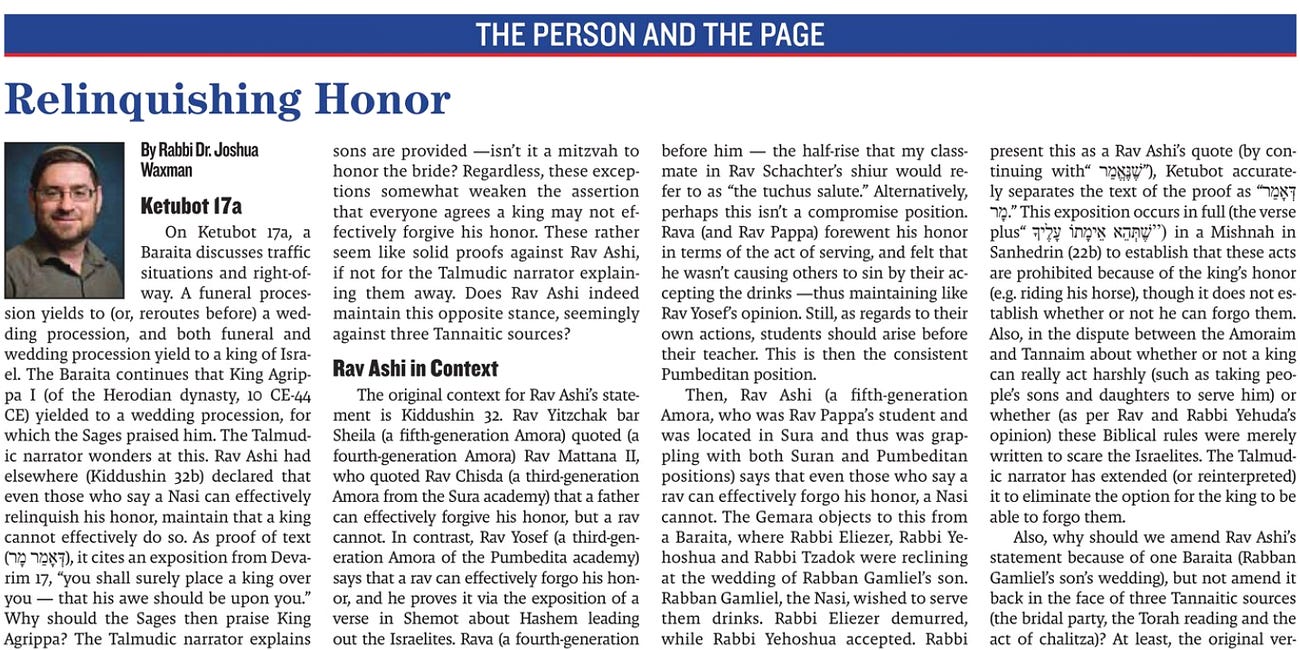Forgoing a King's Honor
In Sanhedrin, we’ve recently been considering whether a king may forgo his honor. For instance, the Mishnah on 20a:
מַתְנִי׳ מֵת לוֹ מֵת – אֵינוֹ יוֹצֵא מִפֶּתַח פַּלְטֵרִין שֶׁלּוֹ. רַבִּי יְהוּדָה אוֹמֵר: אִם רוֹצֶה לָצֵאת אַחַר הַמִּיטָּה – יוֹצֵא, שֶׁכֵּן מָצִינוּ בְּדָוִד שֶׁיָּצָא אַחַר מִיטָּתוֹ שֶׁל אַבְנֵר, שֶׁנֶּאֱמַר: ״וְהַמֶּלֶךְ דָּוִד הֹלֵךְ אַחַר הַמִּטָּה״. אָמְרוּ לוֹ: לֹא הָיָה הַדָּבָר אֶלָּא לְפַיֵּיס אֶת הָעָם. וּכְשֶׁמַּבְרִין אוֹתוֹ – כׇּל הֶעָם מְסוּבִּין עַל הָאָרֶץ, וְהוּא מֵיסֵב עַל הַדַּרְגֵּשׁ.
MISHNA: If a relative of the king dies, he does not emerge from the entrance of his palace [palterin], as it does not befit one of his stature to accompany the deceased. Rabbi Yehuda says: If he wishes to follow the bier, he follows it, as that is what we found with regard to King David, who followed the bier of Abner. As it is stated: “And King David followed the bier” (II Samuel 3:31). The Sages said to Rabbi Yehuda: The matter was only to appease the people, so that they should not suspect David of ordering Abner’s death. And when the people comfort the king with the meal of comfort, all the people recline on the ground, and he reclines on the dargash.
The reason for not leaving is the king’s stature.
Similarly, Sanhedrin 19b:
לֹא חוֹלֵץ וְלֹא חוֹלְצִין וְכוּ׳. אִינִי? וְהָאָמַר רַב אָשֵׁי: אֲפִילּוּ לְמַאן דְּאָמַר נָשִׂיא שֶׁמָּחַל עַל כְּבוֹדוֹ – כְּבוֹדוֹ מָחוּל, מֶלֶךְ שֶׁמָּחַל עַל כְּבוֹדוֹ – אֵין כְּבוֹדוֹ מָחוּל, שֶׁנֶּאֱמַר: ״שׂוֹם תָּשִׂים עָלֶיךָ מֶלֶךְ״, שֶׁתְּהֵא אֵימָתוֹ עָלֶיךָ! מִצְוָה שָׁאנֵי.
The mishna teaches that the king does not perform ḥalitza with his brother’s widow and his brother does not perform ḥalitza with his wife, and Rabbi Yehuda says that he may do so if he wishes. The Gemara challenges Rabbi Yehuda’s opinion: Is that so? But doesn’t Rav Ashi say: Even according to the one who says that with regard to a Nasi who relinquished the honor due him, his honor is relinquished, nevertheless, with regard to a king who relinquished the honor due him, his honor is not relinquished, as it is stated: “You shall set a king over you” (Deuteronomy 17:15), meaning that his fear should be upon you. The preservation of a king’s honor is mandated by the Torah. How could Rabbi Yehuda allow him to waive it? The Gemara answers: A mitzva is different; a king is not disgraced if he relinquishes his honor to perform a mitzva.
The following Mishna is most explicit, with a seemingly identical derasha to that of Rav Ashi, in today’s daf, Sanhedrin 22a:
מַתְנִי׳ אֵין רוֹכְבִין עַל סוּסוֹ, וְאֵין יוֹשְׁבִין עַל כִּסְאוֹ, וְאֵין מִשְׁתַּמְּשִׁין בְּשַׁרְבִיטוֹ, וְאֵין רוֹאִין אוֹתוֹ כְּשֶׁהוּא מִסְתַּפֵּר, וְלֹא כְּשֶׁהוּא עָרוֹם, וְלֹא כְּשֶׁהוּא בְּבֵית הַמֶּרְחָץ, שֶׁנֶּאֱמַר: ״שׂוֹם תָּשִׂים עָלֶיךָ מֶלֶךְ״, שֶׁתְּהֵא אֵימָתוֹ עָלֶיךָ.
MISHNA: One may not ride on the king’s horse, and one may not sit on his throne, and one may not use his scepter, and one may not see him when he is having his hair cut, nor when he is naked, nor when he is in the bathhouse, as it is stated: “You shall set a king over you” (Deuteronomy 17:15), meaning, ensure that his fear should be upon you. All of these actions would lessen one’s fear of and reverence for the king.
We also had a Talmudic or scribal confusion yesterday, where I claimed that Rav asserted that the draconian laws of kingship in Sefer Shmuel was to scare them off. But I think that some scribe misinterpreted the words אֶלָּא לְאַיֵּים עֲלֵיהֶם, so copied over the derasha from Rav Ashi and / or Rabbi Yehuda in the Mishnah about ensuring respect and awe for the king. I don’t believe that works out well on a peshat level in the pesukim compared with an equally strong alternative, and therefore its a weaker peshat in the gemara as well.
In terms of the question and answer based on Rav Ashi’s derasha, Tosafot, who have an encyclopedic global knowledge of Talmud, posed an interesting question on 19b.
מצוה שאני - וכה"ג לא משני הש"ס גבי המלך שעבר לפני כלה בפרק האשה שנתארמלה (כתובות דף טז.) דמשני פרשת דרכים הואי ואמאי לא משני מצוה שאני וי"ל דהתם אין המצוה כי אם בשביל כבוד החתן והכלה וכבוד מלך עדיף טפי מכבוד החתן וא"כ ליכא מצוה אבל הכא גבי יבום מצוה איכא:
If the gemara will say that a mitzvah is different in answer to a king actually being mochel on his own honor, then why not say it in Ketubot, where Rav Ashi said the same thing, and there was an issue of a king vs. a bridal party at a crossroads, where the king gave way to them. Tosafot provide an answer, how that case was not a mitzvah. But I think I have a better answer.
Here’s where you can read by prior post / Jewish Link article on Ketubot 17a.
Relinquishing Honor (full unlocked article)
In yesterday’s daf, Kiddushin 32, we discussed a father, teacher, king, and nasi relinquishing honor. A while back, for Ketubot, I wrote an article, which I will repost here.
I won’t provide a full summary, but here are some essential points:
Our sugya in Sanhedrin is secondary; I think the sugya in Ketubot is also secondary, and Kiddushin 32 is the primary sugya.
The original statement from Rav Ashi was different, that a rav (according to some) can forgo his honor, but a Nasi cannot.
There are problems with this based on a story of a Nasi forgoing his honor.
Therefore, they revise it to be that a Nasi (Prince) can forgo, but a King cannot. And we pair this with a convenient derasha, borrowed from our Mishnah in Sanhedrin.
I would not revise. Where a Nasi serves others at his son’s marriage, this isn’t forgoing his honor. This is to his very honor, that he gets to play host to Sages at his son’s marriage party. It increases the greatness of the celebration. The same regarding those other Sages.
Meanwhile, a Nasi is greater than a rav, and greater than a king. A rav just has rabbinic status. A king just has kingly status. A Nasi is both from the Davidic line and is kingly, and is a rav, as the leader of the Sanhedrin. So a Nasi in particular is stronger than a king, and cannot forgo his honor.
If so, a king can certainly forgo his honor at a crossroads.
Done with the relevant ideas I’m selecting from this article. This doesn’t answer why the Talmudic Narrator’s answer here isn’t proffered there in Ketubot. But I’d say that neither of these sugyot are primary, so different Talmudic Narrators can resolve it in different ways. Also, it isn’t something that requires resolution, because Rav Ashi never said it.



